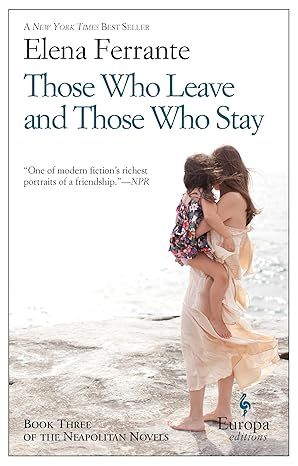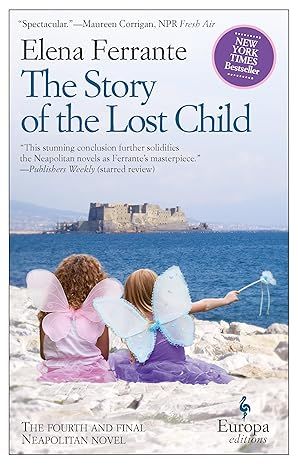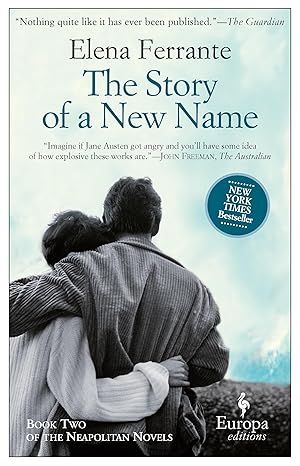Those Who Leave and Those Who Stay: A Novel (Neapolitan Novels, 3)
4.4 out of 5
13,787 global ratings
Part of the bestselling saga about childhood friends following different paths by “one of the great novelists of our time” (The New York Times).
In the third book in the New York Times–bestselling Neapolitan quartet that inspired the HBO series My Brilliant Friend, Elena and Lila have grown into womanhood. Lila married at sixteen and has a young son; she has left her husband and the comforts her marriage brought and now works as a common laborer. Elena has left the neighborhood, earned her college degree, and published a successful novel, all of which has opened the doors to a world of learned interlocutors and richly furnished salons. Both women are pushing against the walls of a prison that would have seen them living a life of misery, ignorance, and submission. They are afloat on the great sea of opportunities that opened up for women during the 1970s. And yet, they are still very much bound to each other in a book that “shows off Ferrante’s strong storytelling ability and will leave readers eager for the final volume of the series” (Library Journal).
“One of modern fiction’s richest portraits of a friendship.” —NPR
400 pages,
Kindle
Audiobook
Hardcover
Paperback
First published September 1, 2014
ISBN 9781609452339
About the authors
Elena Ferrante
Elena Ferrante is the author of seven novels, including four New York Times bestsellers; The Beach at Night, an illustrated book for children; and, Frantumaglia, a collection of letters, literary essays, and interviews. Her fiction has been translated into over forty languages and been shortlisted for the MAN Booker International Prize. In 2016 she was named one of TIME’s most influential people of the year and the New York Times has described her as “one of the great novelists of our time.” Ferrante was born in Naples.
Read more
Reviews
Charles R. Myers
5
I can't remember when I have been so completely taken with a series of novels as I have been with these beautifully written and
Reviewed in the United States on February 11, 2015
Verified Purchase
Those Who Leave is the third book in the author's "Neapolitan Novels" (with the fourth, The Story of the Lost Child, scheduled for publication in the U.S. in September 2015) and it is as gripping and enthralling as the first two. The series is set in a somewhat insular neighborhood of Naples. It is now the late 1960s and 1970s and the two main characters, whose friendship constitutes the center of the books, are now somewhat estranged as their lives have grown complicated and divergent. Still living in Naples, Lina has separated from her husband and is raising her young son while Elena has graduated from college and published a novel. But the actually events of the narrative are not the author's primary concern. Rather, it is the internal life of the two characters and how their own idiosyncratic reactions provide a shape to their stories. In addition to drawing complex characters, Ferrante provides a fascinating portrait of the culture of this slice of Italy during rapidly evolving times. Taken together, the novels are both a coming-of-age story and a coming-into-maturity tale of two diverse women who somehow maintain their own complex, and often convoluted, relationship. I can't remember when I have been so completely taken with a series of novels as I have been with these beautifully written and deeply realized stories, and I am having trouble waiting for the final volume. I recommend Those Who Leave and the two previous books in the series with absolutely no reservations.
Read more
2 people found this helpful
Amazon Customer
5
you can't quite figure out why you like it so much
Reviewed in the United States on April 28, 2016
Verified Purchase
In book one you realize Elena Ferrante is a powerful storyteller with an authentic female voice; something nags at you, you can't quite figure out why you like it so much. Maybe because is seems so personal and brave-- she talks about the things we hide in ourselves. In book two, there is a certain point where you realize how brilliant she is and how subtle and layered that brilliance is; it shines new light on book one. In this book, book three (yes read them all and read in order to see the way she evolves her writing) there is a point where I actually laughed with delight to discover something new about her characters and her writing-- a layer of metaphor and universal pull that further underscored the intelligence she is so comfortable with she never has to let it dominate. Only the story, the characters, the sweep of human emotion dominate is such a gentle way that you find yourself suddenly crying or in awe or gasping-- and you have no idea why, all she is just slowly finds it's way into your soul. When I hear there's a book that a lot of women love, that's sweep the country in sales just on word of mouth, I generally run in the other direction. But when I saw the fourth book on the NYT ten top books of the year, I had to reconsider and am so glad I did. Yes it is a book women will especially love but not because it is light and silly and romantic-- because it is harsh and beautiful and brings life into a city and a friendship in a way we all understand but have never heard expressed in such a bold and completely vulnerable way.
Read more
2 people found this helpful
propertius
5
Shelve This Series Between Proust And Faulkner
Reviewed in the United States on September 9, 2014
Verified Purchase
It appears that Elena Ferrante is intent upon surprising her readership constantly not only in the intensity and complexity of her work, but also in the form. It had been anticipated that this book would be the capstone of her Naples trilogy, the other two books being "My Brilliant Friend" and "The Story of a New Name." This is not the case since the ending of this book indulges the reader by indicating that a fourth "Naples volume" is in the making.
This book indicates that her ambition is almost Proustian or Faulknerian in scope for this series. There is the continuation of the tortured relationship between the narrator Elena and her childhood friend Lila and the ebb and flow of all the tributaries that haunt these two, whether it be the old neighborhood, the mangled relationships of old lovers, families, regional disputes etc. Where this volume diverges from the other two is that there is more theoretical talk between Elena, Lila, and Elena's lover and her husband. When a writer has a character talk about the art of writing and the creative process, you should pay close attention to those sections.Yet this novel does not yield an inch to its predecessors in dramatic intensity and I feel that it surpasses them substantially.
Not only is there an intensity but also an urgency conveyed in this book that accelerates to the last chapter which ends with all the force of old Hollywood cliffhangers. However whereas the other two books in this series could almost be read as stand-alone works, this one does require that the reader to have acquainted himself with the at least the second book in the series.
There is a constant sense of wonder in that Ms. Ferrante conveys the "woman's perceptive" or sensibilities throughout the novel without falling into preaching or propagandizing. This is certainly art, after all we do not limit say a Hemingway by saying he writes for men or T S Eliot's "The Love Song of J Alfred Prufrock" is only for shy middle-aged men, we would be doing them and us a disservice. And so it should be for Ferrante. No one can read this book and not come away with a heightened sense of the human condition and one may start thinking of the story of and the relationship of Elena and Lila in the same way with think of Caesar and Cleopatra or Achilles and Hector. It is that great.
Read more
54 people found this helpful
Amazon Customer
5
I enjoyed reading all the four books of Neapolitan novels
Reviewed in the United States on December 4, 2015
Verified Purchase
Elena Ferrante made me revive trhough her vivid writing the time and the places where I grew up. I enjoyed reading all the four books of Neapolitan novels. I think that she lived trough those novels, then she decided that was time to let her readers disclose that period of very hard time people lived trough it. The emphasis of friendship between Lena and Lila has been the focal point of the many changes that took place in that dilapidated area of Naples. For us Neapolitans having lived during the postwar period, friendship was something sacred to cherish. Ferrante is also telling us that education is very important in order to overcome the emptiness and the ignorance of a past regime had was imposed on our parents.She also describe the struggles and sacrifices the young people had to overcome in a time of have and have not. Lena helpd by her friend Lila made her life in the right way, but Lila as the other girls preferred to follow the life of married women and being provided for what they never had as children. Ferrante ,however, empower Lena's ambition as a writer just like herself.Fiction or Not?....I myself could identify ,as I already said, trough the different stages of these young women of the old neighborhood.I decided to leave and made my life in the USA. Very sad to read the story of the lost child. Ferrante's description of greed and self-destruction, of once content and simple people, now living trough drugs addiction, smuggling goods, abuse of the working class, political dishonesty, camorra, killings,robberies. I've seen all the described changes, visiting throughout the years my relatives and my childhood friends.
decided to leave and take a different path in my life
Read more
5 people found this helpful
Amazon Customer
5
Love These Books!
Reviewed in the United States on September 13, 2022
Verified Purchase
I saw the series before reading the books and I am so very glad I am reading them! Ferrante is an amazing writer - so much detail & insight, you understand how these character's personalities easily after the first book. I still have the fourth in this series to go & definitely plan on reading her other works as well.
Jade Green
4
It is good but quite reading
Reviewed in the United States on May 3, 2023
Verified Purchase
This is Elena Ferrante's third Neapolitan Novel. The whole story is interesting and worth reading. However, just like her second one, the third one is quite reading, I think the whole volume can be reduced a little. Even though the book is a page turner, I finished this one in two days and felt I needed a break after I read it.
Spoiler: I just realized Elena's love for Nino is actually the thread of the whole story, even I as a reader hoped Elena could forget such seemingly unworthy person, but love was illogical and cannot be reasoned. I haven't read the fourth book yet, so I don't know what would happen in the last book about their love, I only hope the love would not destroy Elena's life and her path to the success as a writer, even Nino seemed to appreciate her talent more than Pietro.
Read more
2 people found this helpful
PlantBirdWoman
4
Those Who Leave and Those Who Stay by Elena Ferrante: A review
Reviewed in the United States on March 29, 2016
Verified Purchase
"Each of us narrates our life as it suits us." - Lila Cerullo in Those Who Leave and Those Who Stay
This is the third in Elena Ferrante's acclaimed Neapolitan Quartet of novels which chronicle the lifelong friendship of Lila and Elena. In this one, the women have reached their mid-twenties and we follow them to their early thirties. The time is 1969 to the mid-'70s.
I think it would be a huge mistake to try to read any one of these novels as a stand-alone or to read them out of order. Each one builds on the previous book(s) and each is a continuation of that narration of two lives.
Here we find that Lila, having left the comforts or at least the prestige offered by her marriage to the businessman Stefano, is working at a sausage factory and living, along with her young son, with her childhood friend Enzo who is in love with her. They maintain a platonic relationship.
Lila is overworked and stressed out, struggling to survive financially, emotionally, and intellectually. The brilliant child that she had been had been forced to leave school early and chose marriage as her escape. When that didn't work out, she left the marriage and is now trying to make it on her own. That isn't working so well either.
Elena, of course, has been luckier. She received lots of help and support from teachers and others who believed in her along the way and she was able to complete college and write a novel that proved very successful. It was a novel that shocked many in her old neighborhood with its frank discussion of sexual relationships.
At the beginning of this book, she is engaged to be married to a brilliant young professor from an upper class family, a man who is her intellectual equal. The book follows their first few years of marriage and the births of their two daughters. As a wife and new mother, Elena, too, is harassed and stressed out by her marital and parental responsibilities, unable to write. She is miserable.
All around the women and their families, Italy and Europe and, indeed, the Western world are exploding in the late '60s and '70s with political and social unrest. Their old neighborhood of Naples is becoming even more violent and childhood friends are involved in the labor movement and the violent clashes between communists and fascists. Some of them lose their lives in the violence.
Meanwhile, Elena is on the sidelines and seeking a way in and a way to write about what is happening. She becomes interested in the feminist movement and, in her own way, pulls Lila along.
In this book, the women's friendship is sorely tested time and again. But at the lowest point in Lila's life, the person she asks for is Elena and when Elena comes and sees the state she is in, she resolves to help her, even though at times she hates her and wishes her dead.
Through her efforts, Lila and Enzo are able to get better jobs and to improve their condition. But Elena still is suffering a drought in her writing career.
So many events from the girls' childhood and their earlier lives come back to play pivotal points in this story - which is why it is so important to read the books in order. That time that Lila designed a shoe in book one comes back to be talked about and to play a part in book three. The day that Elena and Lila skipped school and walked as far away from the neighborhood as they could - it was Lila who finally wanted to turn back; or when Lila held a knife to a man's throat to protect herself and Elena; all of these prior events are still a part of the narrative.
Ferrante seems to say that it is from such events that may have seemed rather insignificant at the time that the fabric of female friendship is woven. It is not at all a simple or smooth fabric. It is bumpy with every human emotion including such negative ones as fear, rage, and jealousy. But there is also respect and the unbreakable thread of shared experiences that keeps it all together.
These novels are so extraordinary for showing the choices that Elena and Lila are forced to make as they attempt to escape the poverty and violence of their neighborhood. And this particular novel shows how some of those choices that may have seemed right at the time turned out to be serious mistakes.
Elena, for example, for all of her laudable attempts to help Lila, makes some personal choices here that cast her in a very bad light and that I suspect will prove, in the fourth book, to be a source of regret. But for that we'll have to wait and see, won't we?
Read more
3 people found this helpful
S. Thompson
4
An Entertaining and Intelligent Trilogy
Reviewed in the United States on April 30, 2015
Verified Purchase
My review covers all three books in Ferrante's trilogy.
The story line is about two lifelong girlfriends and the differing paths and approach that they both take from small children to their early 30's. The story also includes just about every significant person in both of their lives from family to friends to shopkeepers et al. The cast are summarized at the start of books 2 & 3. By the end of the trilogy, the reader becomes so familiar with cast that they can easily become part of the story. Based on these relationships, several themes are built around politics, marriage, roles of women, class distinctions and so on. You have a very full story line that is extremely well written and worthy of high regard. The emotional descriptions of the characters were honest and captivating. The characters are distinct and the plot believable without any trite manipulations of the audience. Enduring and exceptionally written. This could be an amazing movie.
If I could give this book 4 1/2 stars, I would have because there is one flaw as others have mentioned. The story periodically drags and I found myself trudging through spots in the book that seemed like unnecessary details. For example: The two girlfriends have points of conflict through the years where the emotional drivers of their discord is repeated in great descriptive detail such as the insecurity of one or the selfishness of the other. We know them by now and I think these type of things could have been creatively condensed. Overall, an epic family story and worth my time.
Read more
MJ
4
no payday of an ending but a nice reading experience
Reviewed in the United States on June 19, 2017
Verified Purchase
Once, when I was a teenager back in the good old 1990's, I was reading Seventeen Magazine and came across a candy-bar ad. The ad was a picture of the candy-bar, and the slogan that it was "totally nuts." In the background there was a lot of text in very fine print. I started reading this text, which was a parody version of a 90's teenage girl rambling on forever about nothing. Phone conversations, clothing descriptions, the word "like" thrown in every tenth word or so. Yet I kept reading the whole thing. I was mesmerized and oddly soothed by the repetitive nothingness of the "story." And then, over halfway through, the story was interrupted by congratulations for making it through such a "nutty" story and offered me a free teeshirt.
What does this have to do with Elena Ferrante's novel? The repetitive, almost nothingness of the story through the first three books had a similar feeling for me, and I found myself remembering that ad for the first time in many years. Much as I was compelled to finish the advertisement, I also could not put these books down, and I have now finished the 4th novel. This being said, I do not know if I can honestly describe them as being great storytelling. The protagonist (Lenù) is unlikable and rather selfish and short-sighted. She has enough intelligence to excel in school with a lot of hard work, but she never exhibits her own opinion and keeps trying to act in a way that people will reward with praise rather than have any ideas or presence of her own. But yet she is sympathetic at times as someone trying to be her best self, using education as the means. Lila, the friend, is fascinating, but remains a bit of an enigma throughout the books. I wished many times that we were reading the story from her perspective. But I did read it all, and the two women characters do grow up and hit milestones of life throughout the books, but the pattern that they go through remains the same always as they age.
Definitely worth reading if you are a reader of novels. A well written, and a unique kind of story for sure, but kind of like reading a teenage girl's long ramble of her inner consciousness that she is aware someone is going to read one day. But the novel does provide plenty of deeper themes to think about and ponder. Feminism, poverty, the modern era and how it changed society, and yet how things stay the same too. The mid-century Italian setting was interesting and was a great atmosphere to the novels. Perhaps if a free tee-shirt had been offered in the middle of the book, it would have gotten 5 stars from me, but alas that was not the case.
Read more
10 people found this helpful
Tony Covatta
3
How do such intelligent women make such poor choices in life?
Reviewed in the United States on August 18, 2015
Verified Purchase
I did not think Volume Three of this extraordinary soon to be tetralogy was up to the standards of the first two books. Then again, perhaps I am just getting tired, as I have read all three over the last few weeks. As that fact indicates, I did find the work gripping, and Volume Three was no different at least through the middle of the book.
As usual, the emotional link between the two women, now in their twenties and early thirties is intense, and vividly rendered. Beyond that, the depiction of the union organizing and fascist and anti-fascist strife was done very well. I have read little like it.
Nevertheless, for me this whole series has major flaws. While it is very upscale chick lit and an entertaining read, perhaps the stuff of a major television mini-series, this is not great literature. There is far too much dependence on mindless coincidence. Simlarly, the introduction of Elena's younger sister Elisa as an important character late in the book, without any preparation is a major flaw. As usual, for the most part, the minor characters are only lightly drawn and are virtually indistinguishable.
But it is the major characters who gave me most pause. Lila becomes in this volume nearly a character out of science fiction. She has almost superhuman powers. She is prescient, beautiful, and every man falls ineluctably in love with/lusts after her. It is too much. Similarly, after three volumes and 1200 pages, it is clear that Elena is stuck on the womanizer Nino, but I defy anyone to tell me why. There is no basis for it outside of Elena's psyche, and she is not sharing that with us.
The action is melodramatic, operatic. The attempts at explanation of the ladies' feelings are sophistical. We never really know what Lila and Elena are thinking. They switch at a moment's notice and there is never any real explanation for the changes. Each of them lacks an observing ego--something characters always exhibit in the best art--getting to the heart of what makes them tick. After all this sturm and drang, Elena still doesn't know herself and is still almost totally dependent on others to get along in life. I won't spoil the end of the book except to say that to me it was morally and psychologically disappointing in the extreme.
I would say more except that the last page prompts me to predict that Elena will have yet another reversal of fortune early in Volume 4 (which I will read). Lila does not know herself either, and her turning into a computer wizard after being a journeywoman sausage stuffer strains one's credulity.
Finally and unfortunately, like so many other characters in modern fiction and in life, the two are driven by needs for sex, money and social status, not by love. This work is less than the sum of its parts.
Read more
72 people found this helpful
Top Elena Ferrante titles
Best Sellers

The Tuscan Child
4.2
-
100,022
$8.39

The Thursday Murder Club: A Novel (A Thursday Murder Club Mystery)
4.3
-
155,575
$6.33

Sapiens: A Brief History of Humankind
4.6
-
140,302
$13.49

The Butterfly Garden (The Collector, 1)
4.3
-
88,556
$9.59

Things We Hide from the Light (Knockemout Series, 2)
4.4
-
94,890
$11.66

The Last Thing He Told Me: A Novel
4.3
-
154,085
$2.99

The Perfect Marriage: A Completely Gripping Psychological Suspense
4.3
-
143,196
$9.47

The Coworker
4.1
-
80,003
$13.48

First Lie Wins: A Novel (Random House Large Print)
4.3
-
54,062
$14.99

Mile High (Windy City Series Book 1)
4.4
-
59,745
$16.19

Layla
4.2
-
107,613
$8.99

The Locked Door
4.4
-
94,673
$8.53




